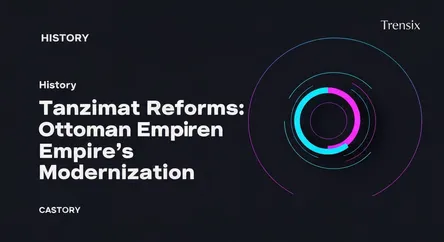History
Tanzimat Reforms: Ottoman Empire's Modernization

An overview of the Tanzimat, a pivotal 19th-century reform period in the Ottoman Empire aimed at modernization, centralization, and social reorganization.
What is it?
The Tanzimat, meaning "Reorganization," was a period of wide-ranging reforms in the Ottoman Empire from 1839 to 1876. Initiated by reformist sultans and bureaucrats, its primary goal was to modernize the state to counter its decline and resist external pressures from European powers. The era began with the Edict of Gülhane (1839), which promised major changes. The reforms targeted numerous areas, including the military, legal codes, and administration. Key changes involved creating a modern conscripted army, introducing new commercial and criminal laws modeled on European systems, establishing a secular school system, and reorganizing the government's finances and administration.
Why is it trending?
The Tanzimat remains a significant topic in history because it represented a fundamental attempt to transform the theocratic Ottoman Empire into a modern state. The reforms were a direct response to the empire's territorial losses and the growing influence of Western powers. The period is crucial for understanding the complex dynamics of modernization, centralization, and the origins of Turkish nationalism. It sought to create a common Ottoman identity ("Ottomanism") by promoting equality among the empire's diverse religious and ethnic groups in hopes of securing their loyalty. The Tanzimat's successes and failures heavily influenced the empire's final decades and the subsequent formation of modern Turkey.
How does it affect people?
The reforms profoundly impacted the lives of Ottoman subjects. A central promise was the establishment of security for life, honor, and property for all, regardless of religion or race. This led to granting non-Muslims legal equality with Muslims for the first time, altering centuries-old social structures. Fairer methods of taxation and military conscription were introduced, replacing often corrupt systems. The Land Code of 1858 modernized agriculture and allowed individuals the right to own land. A new secular education system was developed, creating a new class of Western-educated elites and expanding opportunities, including for women. However, these changes also faced resistance from conservative factions and inadvertently fueled nationalist movements among non-Turkish groups.